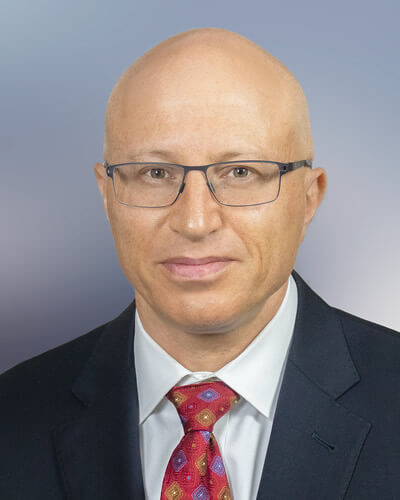Disc Replacement Surgery FAQs With Dr. Goldberg
What is Disc Replacement Surgery?
Disc replacement surgery is a modern spine procedure that aims to treat patients with chronic back pain caused by damaged spinal discs. Unlike traditional spinal fusion surgery, which permanently fuse two or more vertebrae and limits range of motion, disc replacement surgery involves replacing the damaged spinal discs with an artificial disc. This can lead to better overall mobility, quicker recovery time, and decreased likelihood of needing surgery again in the future. At Seaview Orthopaedics, our spine, neck, and back specialists are dedicated to leveraging the latest technological advancements to ensure the best possible outcomes for our patients
What Conditions Are Treated with Disc Replacement Surgery?
Disc replacement surgery can be done to treat a variety of disc conditions, such as degenerative disc disease, herniated discs, chronic discogenic pain, and, in some cases, spinal stenosis and spondylosis. These conditions involve damaged or worn spinal discs that cause pain and reduced mobility. By replacing the damaged disc with an artificial one, the surgery aims to relieve pain, restore spinal function, and improve the patient’s quality of life.
How Successful is Disc Replacement Surgery?
Disc replacement surgery is generally very successful, with many patients experiencing significant pain relief while restoring range of motion. Due to the minimally invasive nature of the procedure, patients can resume their normal activities more quickly.
Who is a Candidate for Disc Replacement Surgery?
An ideal candidate for disc replacement surgery is an individual suffering from chronic neck or back pain who has failed conservative treatments such as injections or physical therapy. However, older patients with cervical arthritis may be less suitable for disc replacement and may benefit more from spinal fusion.
How Long is the Surgery and Recovery Process?
The duration of the surgery may vary depending on the number of discs being replaced, but surgery typically lasts about one to two hours. Post-operatively, patients will complete a physical therapy program for approximately four weeks. By around six weeks, patients can generally expect to resume their normal activities, though this timeline may be influenced by individual recovery rates and adherence to rehabilitation protocols. Regular follow-up appointments with your surgeon are essential to monitor progress and ensure optimal outcomes.
Disc Replacement Surgery vs Spinal Fusion
Disc Replacement:
Involves removing the damaged spinal disc and replacing it with an artificial disc.
Spinal Fusion:
Involves permanently fusing two or more vertebrae in order to limit motion and stabilize the spine.
Disc replacement is preferred in most cases because it typically leads to a quicker recovery, reduced pain, and a lower risk of future complications. Patients can generally return to their normal activities faster and enjoy a higher quality of life compared to those who undergo spinal fusion, which can restrict movement and potentially cause additional issues over time. For patients with severe arthritis, spinal instability, or deformities, a spinal fusion may provide more benefit. A consultation with your doctor will help clarify which procedure is best by assessing your specific spinal condition, symptoms, and overall health.
Schedule an Appointment to Discuss Disc Replacement Surgery in NJ
If you or someone you know has been suffering from chronic neck or back pain and want to find out if disc replacement surgery may be suitable for you, book an appointment with one of our orthopedic spine specialists across our six office locations in Monmouth, Ocean, and Middlesex counties.
Meet Dr. Goldberg
Dr. Goldberg has over 16 years of experience specializing in the treatment of spinal disorders including sciatica, arm and leg pain, neck and back pain, neurological deficits, trauma, and cancer. He also specializes in all aspects of spine surgery, including minimally invasive spine surgery, endoscopic spine surgery, disc replacement surgery, and motion-preserving spine surgery.


